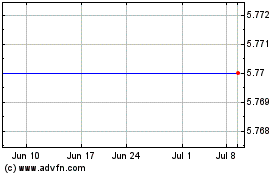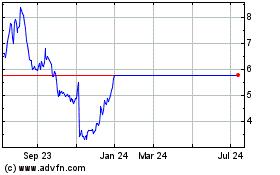Net-Neutrality Rules Could Be Eased Under Donald Trump, Some Say
November 09 2016 - 5:32PM
Dow Jones News
By John D. McKinnon and Shalini Ramachandran
Donald Trump's presidential election victory has increased the
chances that President Barack Obama's landmark net-neutrality rules
could be rolled back, some telecom investors and experts said
Wednesday.
The rules, adopted by the Federal Communications Commission in
early 2015, marked a major victory for Silicon Valley companies,
such as Alphabet Inc.'s Google unit. Aimed at ensuring a level
playing field online, the net neutrality rules require
broadband-access providers to treat all content coming across their
networks equally, without blocking or slowing competitors or
speeding up the content of those who pay more.
Many broadband providers, such as Comcast Corp. and AT&T
Inc., have fought hard against the rules, arguing they could
undermine investment, particularly by imposing a form of
utility-style regulation. Those firms have argued for a
less-intrusive approach that preserves the basic principle of net
neutrality.
Mr. Trump tweeted criticisms of the current rules soon after the
president started pushing them in late 2014, saying, "Obama's
attack on the internet is another top-down power grab."
On Wednesday, a day after Mr. Trump's victory, investors and
policy wonks alike were buzzing about the possibility that the
incoming president could seek to scale back the rules' reach by,
for instance, abandoning the utility-style approach.
Dish Network Corp. CEO Charlie Ergen said on the company's
third-quarter earnings conference call that the rules may get
"another look." He added, "You may see net neutrality be challenged
or weakened going forward."
Berin Szoka, president of TechFreedom, a conservative advocacy
group, said there is now "a new opportunity to end the divisive and
distracting fight over net neutrality." He predicted that either a
Trump FCC or the GOP-run Congress would "reverse [the] staggering
power grabs" made in connection with the rules.
A federal appeals court panel upheld the rules earlier this
year, but legal challenges continue.
A net neutrality rollback would be cheered by cable and telecom
firms but fiercely opposed by the likes of Dish and other streaming
services. It also would be likely to generate strenuous opposition
from some consumer groups.
Mr. Trump, an occasional critic of Silicon Valley during the
campaign, likely must worry about alienating firms that are capable
of stirring protests on the internet.
Meanwhile, AT&T officials held out hope that their planned
merger with Time Warner Inc. eventually would win approval, despite
Mr. Trump's professed opposition during the campaign.
Mr. Trump's focus on domestic investment and economic
development "all fit right in with AT&T's goals," John
Stephens, the company's CFO, said at a Wells Fargo conference
Wednesday. "We've been the leading investor in this country for
more than five years running, and our Time Warner transaction is
all about innovation and economic development, consumer choice and
investment in infrastructure."
Write to John D. McKinnon at john.mckinnon@wsj.com and Shalini
Ramachandran at shalini.ramachandran@wsj.com
(END) Dow Jones Newswires
November 09, 2016 17:17 ET (22:17 GMT)
Copyright (c) 2016 Dow Jones & Company, Inc.
DISH Network (NASDAQ:DISH)
Historical Stock Chart
From Aug 2024 to Sep 2024

DISH Network (NASDAQ:DISH)
Historical Stock Chart
From Sep 2023 to Sep 2024
